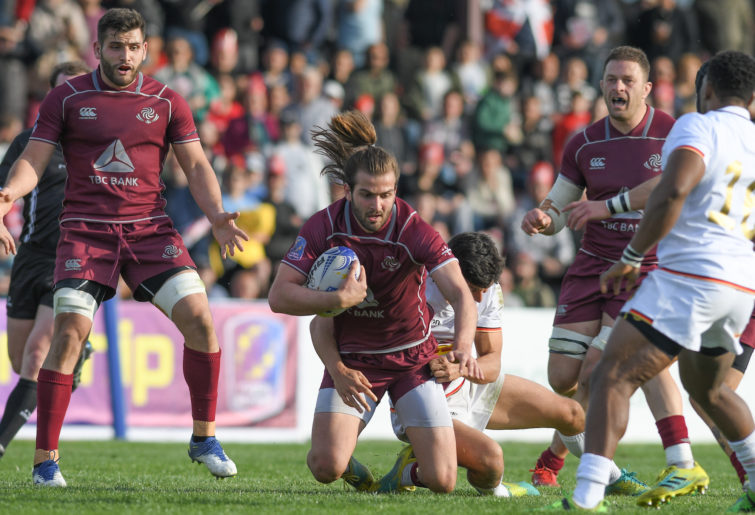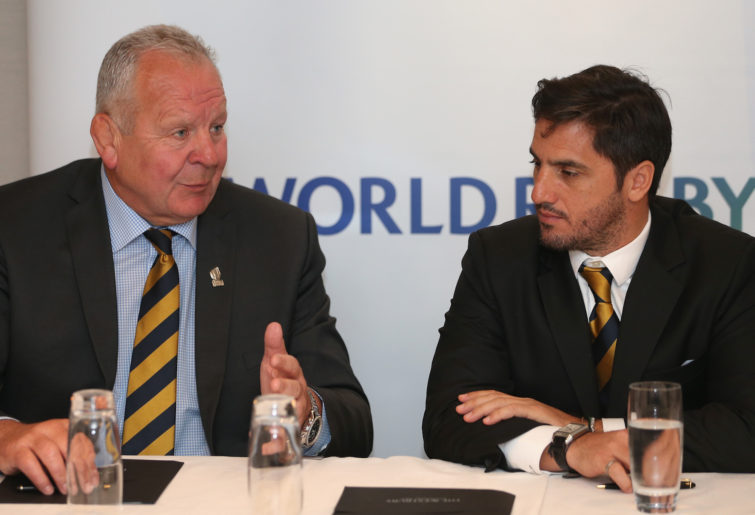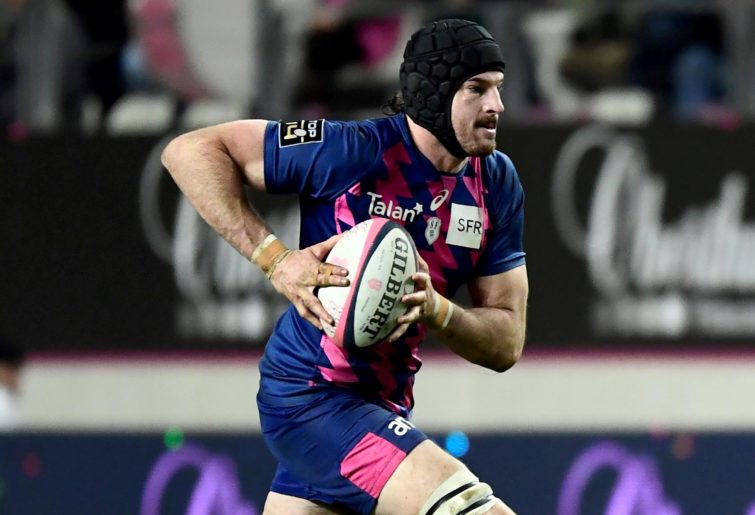A dilemma is often defined as a choice between two undesirable options. It is one word that Georgia seems to find themselves being all too familiar with.
If Georgia is added to the Six Nations, will there be a new serial wooden spoon holder? Or do they keep Georgia in the fray, and potentially let a promising emerging nation wither and stagnate?
Either option is disastrous, especially when finances are also discussed, but a solution may be found at a different level in the rugby hierarchy. Before Georgia can run with the big boys on the international stage, they need to learn to walk on the club stage first.

(Levan Verdzeuli/Getty Images)
Unlike Georgia, all the Six Nations counterparts have at least two fully professional club teams playing in top club competitions. Even Italy, the wooden spooners, have the Top 10, where teams used to earn a place in the Challenge Cup.
Georgia, on the other hand, has no credible professional club team. Currently Georgia has the Didi 10, a semi-professional league contested between ten clubs. This lack of exposure to a professional competition sees the majority of Georgians looking over the borders into the multi-tiered clubs of France, where hopefully they can get a contract.
In order for Georgia to become more successful, they need to create a professional league that would fill the gap between semi-professional and international. Currently, Georgia has a slim bridge between developing their amateur players in the Didi 10 into international athletes.
But how would Georgia ever be able to create a fully professional domestic league? The tiny nation only has a population of 3.7 million, and would have to compete for television with the Georgian Premier League football.
Well, an unlikely alliance may need to be formed by working with their Six Nations B rivals, Romania. As one, Georgia and Romania could establish the Super Rugby of Eastern Europe by cherry-picking the best players from each country’s domestic leagues, and condensing the talent pool into a better quality competition to give players experience.
Georgia could field three professional teams drawing from the Didi 10: one in the capital, Tbilisi, one in Kutaisi (the second largest city in Georgia), and one in Batumi, which has an excellent rugby club already. All three cities have stadiums that the professional football teams use, potentially giving each team a home ground.
Romania could also establish three fully professional teams, but would likely have to make the incumbent Superliga a semi-professional league. Teams could be based in Bucharest, Constanta and Timisoara, which all have teams in the Superliga. With six teams, there could be ten home-and-away games, with two more for finals, totaling 12.

(Photo by Richard Heathcote – World Rugby via Getty Images)
Perhaps even in the future if the league can cement itself and prove its sustainability, then the doors may open to other nations such as Russia and possibly Ukraine or Moldova.
While the Super Rugby of Eastern Europe is a noble idea, it also needs to be a feasible one.
Logistically, the biggest travel distance would be from Timisoara to Tbilisi, 1946 kilometres across the Black Sea. However, in the Pro 14, Treviso to Galway is 1700 kilometres. While this is still a large distance, Edinburgh had to travel 10,342 kilometres to play the Southern Kings in Gqeberha (Port Elizabeth).
Distances such as these are always a hurdle, but in late 2019, Georgia signed an 11-year deal to play in the Currie Cup. An agreement such as that shows that the Lelos are willing to travel to play rugby, crossing continents if need be.
Yet you can’t be too optimistic about Georgia’s involvement in the Currie Cup. The extravagant distance to South Africa was one of the straws that broke Super Rugby’s back. It remains in Georgia’s best interest to avoid the lengthy and costly travel times and stay in Europe.
The biggest hurdle for an Eastern European Super Rugby would be the finances. It isn’t a herculean task though. Just look at Major League Rugby in the United States. At first five amateur rugby clubs had come together and grew to nine, and from that a league of seven was born, and continues to grow. Granted, the sports market in the United States is a monstrous one compared to Georgia and Romania.
Most likely, the majority of the starting finances would have to be fronted by each country’s respective unions. In recent years, World Rugby have been more willing to support emerging nations financially. If World Rugby are willing to support the involvement of Fiji and Moana Pasifika in Super Rugby 2022, and a South American club competition through Sudamerica Rugby, then surely they can find a few bucks to toss the way of Georgia and Romania. After all, Bill Beaumont, World Rugby chairman, wishes to grow the game rapidly.

Bill Beaumont (left). (Andrew Redington/Getty Images)
Other solutions could also be found. Georgian billionaire Bidzina Ivanishvili could also be lured to the table. He was willing to bankroll Georgia’s participation in the Six Nations, and has financially aided Georgia by building training facilities. If the French can have their playboys in the Top 14, can’t Georgia too?
Hours could be spent discussing the logistics and financial hurdles to overcome. So why would the Georgians not simply seek to join an established league like the Pro 14 and forego these problems?
It’s simple. Georgia is not wanted. The Pro 14, who seem to always be looking for expansion in all the wrong places, are more focused on making a quick buck. This year the Rainbow Cup experiment will be on its way. The Pro 14 is hellbent on finding money overseas that can help to match the Premiership and Top 14.
With the introduction of South Africa, it’s easy to see history repeating itself with too many hands in the pot. Look at the Jaguares, who find themselves in the SLAR competition, and the dissolved Sunwolves. In 2017, Super Rugby overstretched to 18 teams across five countries, and now in 2021, the Top 14 is toying with 16 teams in five countries. Surely, history is doomed to repeat itself.
The Pro 14 even considered a North American team before considering Georgia, looking along the East Coast in either Washington DC or New York. The Big Apple itself has more than double the people that Georgia does and would offer bigger financial gains.
A Georgian team would also never be allowed entry elsewhere. The English Premiership and Top 14 are more than happy with their leagues and would not want to give funds to a foreign team. Yet the USA did not wait for the Pro 14 to start a professional comp, and neither should Georgia or Romania. It is in the best interests of Georgia and Romania to start their own league and shape their own destiny.
If Georgia and Romania were to start this league, then what should happen to the European Rugby Champions Cup and Challenge Cup? Currently there are only two options for them: the Challenge Cup (the winner of the now-defunct Continental Shield earned their spot in this tournament), or the newly formed Continental Club Rugby League.
Romania currently have three of their seven Superliga teams participating in the Continental Club Rugby League, but this competition follows a single-round knock-out format too short to help with any real development.
In fairness, the winner of this Eastern European Super Rugby should be given one space in the Champions Cup, albeit in the bottom seed. They would be champions and deserve to be with the other champions. The Top 14, Pro 14 and Premiership would all receive six spots, with the winner from the previous year’s Challenge Cup making the final spot.

(Photo credit Miguel Medina/AFP via Getty Images)
The Challenge Cup, on the other hand, should expand to 24 teams: the 19 remaining Top 14, Pro 14 (excluding South Africa), Premiership teams and the five remaining teams from the Eastern European league. Two 24-team formats could occur: eight pools of three, or six pools of four.
If the six pools of four was the decided favourite, then the quarter-finals could be made of the top seeded team in each pool, and the ninth and tenth ranked team from the Champions Cup, similar to how the UEFA Champions League feeds into the Europa League. This would also allow for a draw, which would keep teams in the Challenge Cup guessing at who they would play next.
Now if things go well, and Georgia and Romania run their own league successfully, then when should they be allowed into the Six Nations? Well, when they earn their spot. They should continue to have games against Tier 1 nations, and when they are able to either beat them, or show sustained competitive score lines, then they should be entered. Georgia would be the best candidate to expand into the Seven Nations. By having seven teams, that would allow a resting week for international players.
Another solution could be a hybrid between the Six Nations and the Copa America, where an invitational team such as Fiji, Samoa, Tonga or Japan could join. These teams could either play every game away or at a neutral venue to grow the game around Europe until Romania could enter.
The concept of an Eastern European rugby competition and an expanded Six Nations is one of wild dreams. In reality a competition like this would be full of uncertainty, and problems to overcome. Yet how long should Georgia and other nations try to find ways to continually develop their players to a high standard.
While a professional club competition won’t instantaneously make Georgia a world-class contender, it can be agreed that doing something is better than nothing. Necessity is the father of intervention, and Georgia needs to invent their own way to develop their players.

































































































